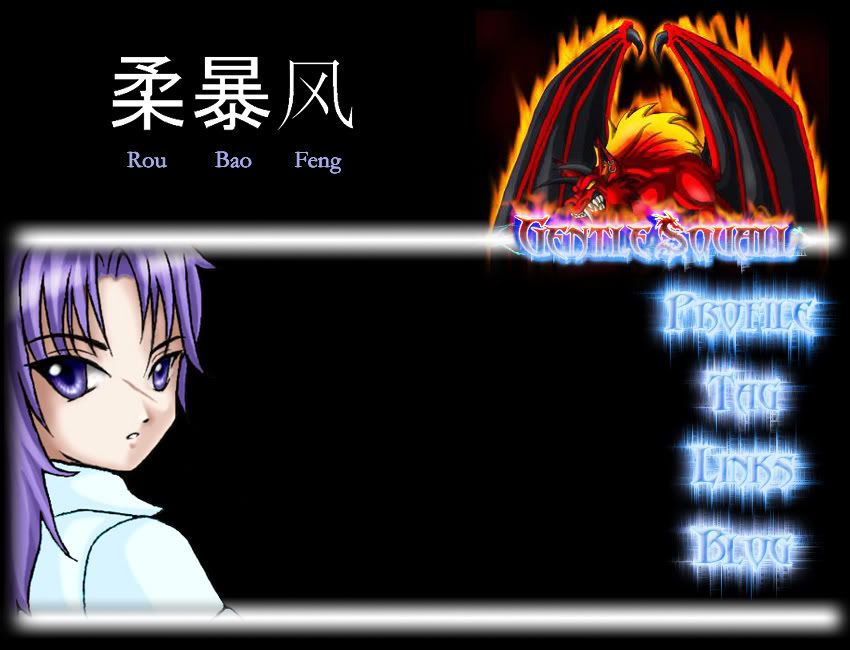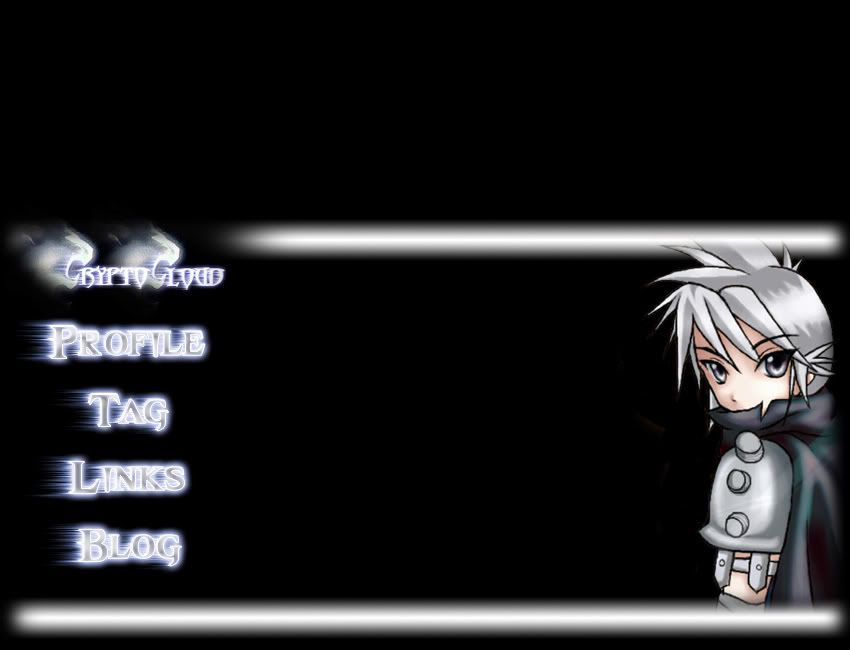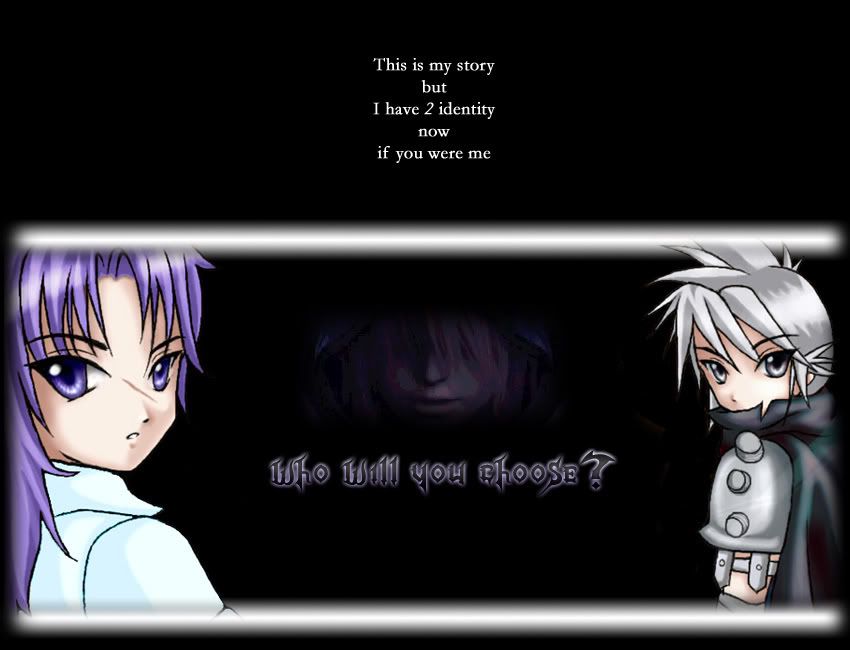









Name: GentleSquall
Class: Guardian Force
Age: Too old for you
Element: Plasma
Weapon: Plasma Crystals
Special Skill: Miraculous Phenomenon
Love: Everything
Hate: Nothing
Story:
The Alpha of all Guardian Forces.
Name: CryptoCloud
Class: Nobody
Age: Nobody Knows
Element: Anti-Matter
Weapon: Unknown
Special Skill: Better Left Forgotten
Love: Nothing
Hate: Everything
Story:
The Omega of Nothing.
INSERT TAGBOX HERE
www. .www
wwww wwww
wwwwvwwww
wwwwwww
wwwww
www
w
: |Friend's blog| :
Æ private blogskin
Æ UIR blog
Somebody
Somebody
Somebody
Somebody
Somebody
Somebody
Somebody
Somebody
Somebody
Somebody
Somebody
Somebody
Somebody
Somebody
Somebody
Somebody
Somebody
Somebody
Somebody
: |Archives| :
: |Friend's blog| :
Æ private blogskin
Æ UIR blog
Nobody
Nobody
Nobody
Nobody
Nobody
Nobody
Nobody
Nobody
Nobody
Nobody
Nobody
Nobody
Nobody
Nobody
Nobody
Nobody
Nobody
Nobody
: |Archives| :
:: Identity Crisis ::
The identity is "a subjective sense as well as an observable quality of personal sameness and continuity, paired with some belief in the sameness and continuity of some shared world image. As a quality of unself-conscious living, this can be gloriously obvious in a young person who has found himself as he has found his communality. In him we see emerge a unique unification of what is irreversibly given--that is, body type and temperament, giftedness and vulnerability, infantile models and acquired ideals--with the open choices provided in available roles, occupational possibilities, values offered, mentors met, friendships made, and first sexual encounters." (Erikson, 1970.)According to Erikson's stages, the onset of the identity crisis is in the teenage years, and only individuals who succeed in resolving the crisis will be ready to face future challenges in life. But the identity crisis may well be recurring, as the changing world demands us to constantly redefine ourselves. Erikson suggested that people experience an identity crisis when they lose "a sense of personal sameness and historical continuity". Given today's rapid development in technology, global economy, dynamics in local and world politics, one might expect identity crises to recur more commonly now than even thirty years ago, when Erikson formed his theory.
Build an air castle
on Sunday, March 22, 2009, 3:26 AM
:: Existential crisis ::
An existential crisis results from:The sense of being alone and isolated in the world,
a new found grasp or appreciation of one's mortality;
Believing that one's life has no purpose or external meaning.
Existential crisis resembles anomie (a sociological concept), the mid-life crisis is an example. Usually, an existential crisis stems from the person's perception of existence.
Non-existential belief systems, such as religion, astrology, and witchcraft, provide compact and logically irrefutable (i.e. tautological) explanations for human existence often invoking a man-made construct of one or more iterations of a supernatural being. A transition to the realization of the absence of fulfillment via religious faith is one avenue to trigger suffering associated with an existential crisis. This sudden appreciation that there is no afterlife and, moreover, the meaning and purpose of one's life is determined from within, not through a irrational narrative defined by others, inevitably leads to substantial personal growth, with the transition through this critical confrontation with the ‘existential’ world a necessary step of maturation
Cognitive dissonance occurs when the man or woman faces the paradox of believing his or her life important, whilst perceiving that human existence is meaningless and without purpose. The person's resolving said paradox results in the existential crisis. For many, a resolution to this crisis is the abandonment of religious beliefs in favor of a rational, non-superstitious relationship to the objective world just confronted. Analogously, existentialism posits that a person can and does define the meaning and purpose of his or her life, hence must choose to resolve the crisis of existence. The terminal synthesis of the crisis most often results in the appreciation of the only true treasure in the world: the inherent self. Thus the resolution produces an insight to the core moral and ethical values intrinsic to our species, made far stronger by shaping in the external world, and now with the strength, judgment and confidence of character to resist the imposition of codes of others. The rejection of religion as the product of existential crises is clearly consistent with such fundamental questioning.
Existential crisis is often provoked by a significant event in the person's life — marriage, separation, major loss, the death of a loved one; a life-threatening experience; psycho-active drug use; adult children leaving home; reaching a personally-significant age (turning 30, turning 40, etc.); imprisonment in solitary confinement, et cetera. Usually, it provokes the sufferer's introspection about personal mortality, thus revealing the psychologic repression of said awareness.
Build an air castle
on Tuesday, July 22, 2008, 3:27 AM
:: Quarter-Life Crisis ::
The quarterlife crisis (QLC) is a term applied to the period of life immediately following the major changes of adolescence, usually ranging from the early twenties to the early thirties. The term is named by analogy with mid-life crisis.Emotional aspects
Kazimir Malevich's impressionist Unemployed Girl (1904)Characteristics of quarter-life crisis may include:
- feeling "not good enough" because one can't find a job that is at one's academic/intellectual level
- frustration with relationships, the working world, and finding a suitable job or career
- confusion of identity
- insecurity regarding the near future
- insecurity concerning long-term plans, life goals
- insecurity regarding present accomplishments
- re-evaluation of close interpersonal relationships
- disappointment with one's job
- nostalgia for university, college, high school or elementary school life
- tendency to hold stronger opinions
- boredom with social interactions
- loss of closeness to high school and college friends
- financially-rooted stress (overwhelming college loans, unanticipatedly high cost of living, etc.)
- loneliness
- desire to have children
- a sense that everyone is, somehow, doing better than you
These emotions and insecurities are not uncommon at this age, nor at any age in adult life. In the context of the quarter-life crisis, however, they occur shortly after a young person – usually an educated professional, in this context – enters the "real world".[1] After entering adult life and coming to terms with its responsibilities, some individuals find themselves experiencing career stagnation or extreme insecurity. The individual often realizes the real world is tougher, more competitive and less forgiving than they imagined. Furthermore, the qualifications they have spent so much time and money earning are not likely to prepare them for this disillusionment.
A related problem is simply that many college graduates do not achieve a desirable standard of living after graduation. They often end up living in low-income apartments with roommates instead of having an income high enough to support themselves. Substandard living conditions, combined with menial or repetitive work at their jobs create a great amount of frustration, anxiety and anger. Nobody wants to admit to feeling like a 'loser'; this secrecy may intensify the problem.
As the emotional ups-and-downs of adolescence and college life subside, many affected by quarter-life crisis experience a "graying" of emotion. While emotional interactions may be intense in a high school or college environment – where everyone is roughly the same age and hormones are highly active – these interactions become subtler and more private in adult life.
Furthermore, a factor contributing to quarter-life crisis may be the difficulty in adapting to a workplace environment. In college, professors' expectations are clearly given and students receive frequent feedback on their performance in their courses. One progresses from year to year in the education system. In contrast, within a workplace environment, one may be, for some time, completely unaware of a boss's displeasure with one's performance, or of one's colleagues' dislike of one's personality. One does not automatically make progress. Office politics require interpersonal skills that are largely unnecessary for success in an educational setting.
Build an air castle
on Tuesday, September 11, 2007, 12:57 AM
:: Identity Crisis ::
The identity is "a subjective sense as well as an observable quality of personal sameness and continuity, paired with some belief in the sameness and continuity of some shared world image. As a quality of unself-conscious living, this can be gloriously obvious in a young person who has found himself as he has found his communality. In him we see emerge a unique unification of what is irreversibly given--that is, body type and temperament, giftedness and vulnerability, infantile models and acquired ideals--with the open choices provided in available roles, occupational possibilities, values offered, mentors met, friendships made, and first sexual encounters." (Erikson, 1970.)According to Erikson's stages, the onset of the identity crisis is in the teenage years, and only individuals who succeed in resolving the crisis will be ready to face future challenges in life. But the identity crisis may well be recurring, as the changing world demands us to constantly redefine ourselves. Erikson suggested that people experience an identity crisis when they lose "a sense of personal sameness and historical continuity". Given today's rapid development in technology, global economy, dynamics in local and world politics, one might expect identity crises to recur more commonly now than even thirty years ago, when Erikson formed his theory.
Build an air castle
on Sunday, March 22, 2009, 3:26 AM
:: Existential crisis ::
An existential crisis results from:The sense of being alone and isolated in the world,
a new found grasp or appreciation of one's mortality;
Believing that one's life has no purpose or external meaning.
Existential crisis resembles anomie (a sociological concept), the mid-life crisis is an example. Usually, an existential crisis stems from the person's perception of existence.
Non-existential belief systems, such as religion, astrology, and witchcraft, provide compact and logically irrefutable (i.e. tautological) explanations for human existence often invoking a man-made construct of one or more iterations of a supernatural being. A transition to the realization of the absence of fulfillment via religious faith is one avenue to trigger suffering associated with an existential crisis. This sudden appreciation that there is no afterlife and, moreover, the meaning and purpose of one's life is determined from within, not through a irrational narrative defined by others, inevitably leads to substantial personal growth, with the transition through this critical confrontation with the ‘existential’ world a necessary step of maturation
Cognitive dissonance occurs when the man or woman faces the paradox of believing his or her life important, whilst perceiving that human existence is meaningless and without purpose. The person's resolving said paradox results in the existential crisis. For many, a resolution to this crisis is the abandonment of religious beliefs in favor of a rational, non-superstitious relationship to the objective world just confronted. Analogously, existentialism posits that a person can and does define the meaning and purpose of his or her life, hence must choose to resolve the crisis of existence. The terminal synthesis of the crisis most often results in the appreciation of the only true treasure in the world: the inherent self. Thus the resolution produces an insight to the core moral and ethical values intrinsic to our species, made far stronger by shaping in the external world, and now with the strength, judgment and confidence of character to resist the imposition of codes of others. The rejection of religion as the product of existential crises is clearly consistent with such fundamental questioning.
Existential crisis is often provoked by a significant event in the person's life — marriage, separation, major loss, the death of a loved one; a life-threatening experience; psycho-active drug use; adult children leaving home; reaching a personally-significant age (turning 30, turning 40, etc.); imprisonment in solitary confinement, et cetera. Usually, it provokes the sufferer's introspection about personal mortality, thus revealing the psychologic repression of said awareness.
Build an air castle
on Tuesday, July 22, 2008, 3:27 AM
:: Quarter-Life Crisis ::
The quarterlife crisis (QLC) is a term applied to the period of life immediately following the major changes of adolescence, usually ranging from the early twenties to the early thirties. The term is named by analogy with mid-life crisis.Emotional aspects
Kazimir Malevich's impressionist Unemployed Girl (1904)Characteristics of quarter-life crisis may include:
- feeling "not good enough" because one can't find a job that is at one's academic/intellectual level
- frustration with relationships, the working world, and finding a suitable job or career
- confusion of identity
- insecurity regarding the near future
- insecurity concerning long-term plans, life goals
- insecurity regarding present accomplishments
- re-evaluation of close interpersonal relationships
- disappointment with one's job
- nostalgia for university, college, high school or elementary school life
- tendency to hold stronger opinions
- boredom with social interactions
- loss of closeness to high school and college friends
- financially-rooted stress (overwhelming college loans, unanticipatedly high cost of living, etc.)
- loneliness
- desire to have children
- a sense that everyone is, somehow, doing better than you
These emotions and insecurities are not uncommon at this age, nor at any age in adult life. In the context of the quarter-life crisis, however, they occur shortly after a young person – usually an educated professional, in this context – enters the "real world".[1] After entering adult life and coming to terms with its responsibilities, some individuals find themselves experiencing career stagnation or extreme insecurity. The individual often realizes the real world is tougher, more competitive and less forgiving than they imagined. Furthermore, the qualifications they have spent so much time and money earning are not likely to prepare them for this disillusionment.
A related problem is simply that many college graduates do not achieve a desirable standard of living after graduation. They often end up living in low-income apartments with roommates instead of having an income high enough to support themselves. Substandard living conditions, combined with menial or repetitive work at their jobs create a great amount of frustration, anxiety and anger. Nobody wants to admit to feeling like a 'loser'; this secrecy may intensify the problem.
As the emotional ups-and-downs of adolescence and college life subside, many affected by quarter-life crisis experience a "graying" of emotion. While emotional interactions may be intense in a high school or college environment – where everyone is roughly the same age and hormones are highly active – these interactions become subtler and more private in adult life.
Furthermore, a factor contributing to quarter-life crisis may be the difficulty in adapting to a workplace environment. In college, professors' expectations are clearly given and students receive frequent feedback on their performance in their courses. One progresses from year to year in the education system. In contrast, within a workplace environment, one may be, for some time, completely unaware of a boss's displeasure with one's performance, or of one's colleagues' dislike of one's personality. One does not automatically make progress. Office politics require interpersonal skills that are largely unnecessary for success in an educational setting.
Build an air castle
on Tuesday, September 11, 2007, 12:57 AM



